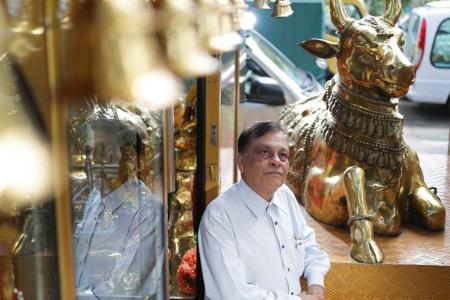Hindu practices given respectful modern tweaks
The Hindu funeral is largely dictated by ancient traditional customs and religious rites, stemming from a belief in reincarnation.
But younger Hindus are starting to tweak some practices when they seek funeral services for their grandparents and parents.
According to Hindu funeral customs, the body remains at the home until it is cremated, which is usually within 24 hours after death.
That has changed, says Roy Selvarajah,the 56-year-old manager of Hindu Casket. Many younger Hindus are not even resting the deceased loved ones at home. They would rather have the bodies rest either at funeral parlours or the void decks of their flats.
"I suppose it would be more convenient for relatives and friends to pay their last respects there, rather than have them all at their flat, which could be quite a squeeze," he explains. "The set-ups at funeral parlours or void decks are nicely done, with canopies and tables and chairs. Such set-ups look more like a reception than a wake."
Hindus also do not generally eat at wakes. "Yet the young today are asking for catering services to be provided."
He believes the older generation has "more or less come to terms with what the younger folks want".
"Previously, death was a taboo subject. No one talked about it or even prepared for it. Today, people are able to understand and accept it is part of the cycle of life. People actually come in to our company for pre-planning consultation.
"This would never have happened 10, 15 years back. Then, people were still highly superstitious."
Hindu Casket was formed in 1985. Having been in the business of death for the past nine years, Mr Roy says he has not only witnessed change in clients' attitudes towards death, he has also experienced changes within the service.
He says the industry is now being run by "(the) more educated, who are professional in their approach".
"Our people are trained to broach the subject with family members and show empathy and sympathy," he says. "Even the family members of many of our staff accept the fact that they are in this line of work. They even talk about it openly."
Hindu Casket is now the only Hindu funeral service provider that has its own showroom and in-house embalming service. "Family members would come to the showroom to select the type of caskets they want. These are usually made of better quality wood and nicer designs.
"The young ones also no longer bring in simple headshots of the deceased loved ones to be placed in front of the hearse. The photos today depict how the deceased lived. They would either be dressed in their golf outfit or even formal wear."
No longer do the family members want to mourn the death of the loved ones. Instead, they want to "celebrate their lives". Whereas before, Hindu funerals did not have eulogies, "today more and more families want to have them", he says.
And up until 10 to 15 years ago, only men would go to the cremation site, led by the chief mourner. "Today, we see more women coming to the crematorium for the final farewell," he says.
Mr Roy is also seeing more families wanting to take their loved one's ashes to the sacred Ganges river in India. This is the Hindu practice of Antim Samskara or end-of-life purification. It is believed that immersing the ashes in the river Ganges helps the soul attain liberation from material bondage.
He says he sees about 20 to 30 families a year choosing to sprinkle their loved one's ashes in Singapore, and then travelling to the Ganges to perform funeral rituals, but increasingly, more families are opting to scatter ashes in the Ganges.
Get The New Paper on your phone with the free TNP app. Download from the Apple App Store or Google Play Store now


